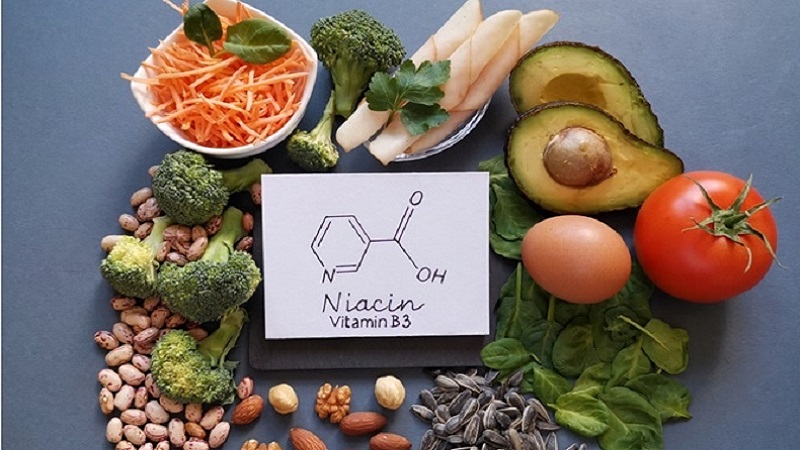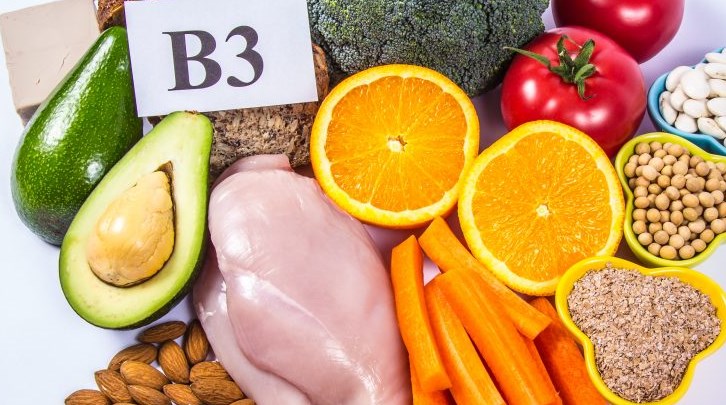Vitamins are organic compounds essential for the life of living organisms, including humans. Although they are needed only in small amounts, vitamins play an important role in many biological processes, including growth, energy metabolism, protecting the body from disease and maintaining overall health. Vitamin B3 also contributes significantly to the overall development of the body. So what is Vitamin B3? What are its uses? Let’s find out together in this article.
What is Vitamin B3?
Vitamin B3 is a vitamin in the Vitamin B group, also known as Niacin or Nicotinic Acid, a water-soluble compound. In the human body, Vitamin B3 plays an important role, essential for the body’s metabolic activities. Vitamin B3 that the body uses mainly comes from foods in the daily diet. In case of excess, the body will automatically adjust to excrete this amount of vitamin through urine.
In the body, Vitamin B3 mainly exists in two main chemical forms with the following roles:
- Niacin (Nicotinic Acid): Has the ability to reduce bad cholesterol in the body, thereby helping to prevent the risk of cardiovascular diseases.
- Niacinamide (Vitamin PP): Helps treat psoriasis and prevents the formation of cancer cells.
The important role of vitamin B3 in the body is to synthesize the coenzymes nicotinamide adenine dinucleotide (NAD) and nicotinamide adenine dinucleotide phosphate (NADP), which are involved in more than 400 biochemical reactions in the body – mainly related to the conversion of energy for the body from the food you eat.
Vitamin B3 is water-soluble, so the body does not store this vitamin. This also means that your body can excrete excess vitamins through urine if it is not needed.
The human body usually gets vitamin B3 through food, but small amounts are also made from the amino acid tryptophan, which can be found in protein sources such as chicken and other meats.

Vitamin B3
The Role of Vitamin B3 in Lowering Cholesterol and Supporting Heart Health
- Reducing LDL cholesterol (recombinant lipoprotein cholesterol): Niacin has the ability to reduce the level of LDL cholesterol (also known as “bad cholesterol”) and triglycerides in the blood. This is helpful in reducing the risk of cardiovascular disease due to high blood fat.
- Increasing HDL cholesterol (high-density lipoprotein cholesterol): In addition to reducing LDL cholesterol, niacin can also increase the level of HDL cholesterol (also known as “good cholesterol”). HDL cholesterol has the effect of removing cholesterol from the blood vessels and returning it to the liver for digestion. Increasing HDL cholesterol can help protect the heart.
- Reducing the risk of cardiovascular disease: The above benefits of niacin, including reducing LDL cholesterol and increasing HDL cholesterol, reduce the risk of cardiovascular disease, including angina and heart attack.
- Maintain heart health: Niacin may also help maintain heart health by improving blood vessel flexibility and reducing inflammation in the blood vessels. However, it is important to note that using niacin to treat cholesterol should be done under the supervision of a medical professional, as high doses can cause side effects such as skin redness, itching, or other discomfort.
10 Foods High in Vitamin B3:
- Liver: Liver is one of the richest natural food sources of niacin. A 3-ounce serving of cooked beef liver provides about 14.7 mg of niacin, which is 91% of the recommended daily intake for men and 100% for women.
- Chicken Breast: Chicken, especially breast meat, is a good source of both niacin and lean protein. A 3-ounce serving of cooked, boneless, skinless chicken breast contains 11.4 mg of niacin, which is 71% and 81% of the recommended daily intake for men and women, respectively. By comparison, the same amount of boneless, skinless chicken thighs contains only half that amount.
- Tuna: Tuna is a good source of niacin and a great choice for those who enjoy eating fish. A 165-gram can of tuna provides 21.9 mg of niacin, which is more than 100% of the recommended daily intake for both men and women.
- Salmon: Salmon, especially wild-caught salmon, is also a great source of niacin. A 3-ounce serving of cooked salmon provides 53% of the recommended daily intake for men and 61% for women, compared to 42% and 49% for farmed salmon.
- Anchovies: Anchovies are a good and affordable source of niacin. Just 10 anchovies will provide you with half of your daily recommended intake. Anchovies are also an excellent source of selenium, which helps reduce the risk of cancer.
- Pork: Lean pork is also a good source of niacin. 3 ounces of lean pork provide about 6.3 mg of niacin, which is 39% and 45% of the recommended daily intake for men and women, respectively.
- Beef: Lean beef is not only rich in niacin, but also contains many other important nutrients such as protein, iron, vitamin B12, selenium and zinc. 3 ounces of cooked lean beef contains 6.2 mg of niacin.
- Avocado: A medium avocado contains 3.5 mg of niacin, which is 21% and 25% of the recommended daily intake for men and women, respectively.
- Brown rice: A cup of cooked brown rice (about 195 grams) contains 18% of the recommended daily intake for men and 21% for women. However, some studies show that only 30% of the niacin in grains is absorbed by the body, making them a less optimal food source than other foods.
- Mushrooms: Mushrooms are one of the best plant sources of vitamin B3. A 70 gram serving of mushrooms provides about 15 – 18% of the recommended daily intake. This makes mushrooms an ideal choice for vegetarians.

Thực phẩm giàu Vitamin B3
Please note: The information in this article is for reference only. Readers should contact a doctor, pharmacist or healthcare professional for the most specific and accurate advice.






glam cinema
October 7, 2024Great article! For those looking for more comprehensive information on health, wellness tips, and expert advice, check out AllAboutHealthInfo.com. It’s a fantastic resource with up-to-date articles on various health topics, from nutrition to fitness and mental well-being. Highly recommend!